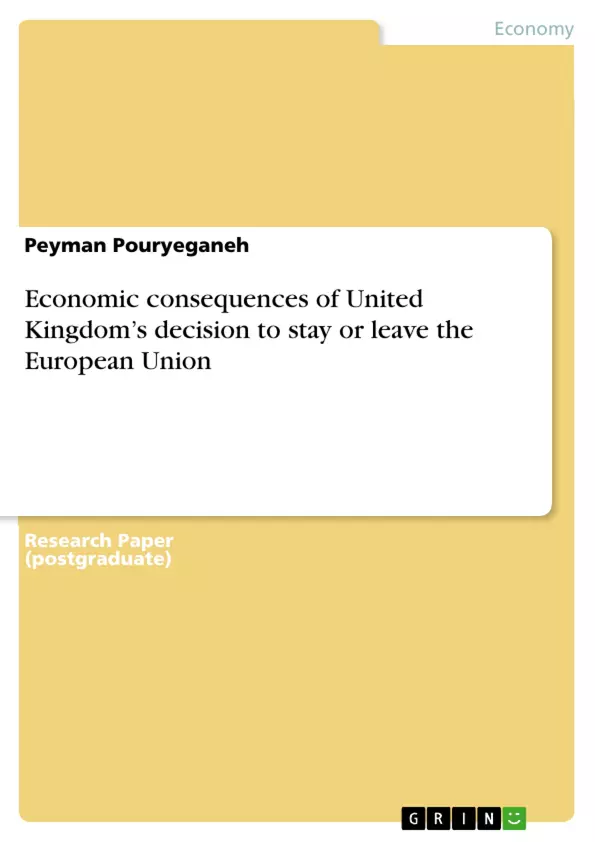What would be the economic consequences of the United Kingdom leaving the European Union? This paper begins by investigating the current economic situation of the EU and the UK. then it evaluates the benefits and the drawbacks associated with the UK’s membership in the European Union, to conclude on whether the economic situation of the UK would be better if it left the EU.
Although, for economic reasons, the UK has consistently shown interest in a deeper European single market, on many occasions, it has demonstrated discomfort with the politics and efforts of other EU members to implement members’ obligations. For the same reason, the country did not adopt euro as its currency in 1999. In addition, and to maintain and control its borders, it did not become a member of the Schengen area and cooperation.
The economy of the UK is mainly services-based with a concentration on financial services although it also maintains capacity in high-tech and other industrial sectors. With a GDP of €1.9 billion in 2012, the UK’s economy is the third largest in the EU after Germany and France, and accounts for more than 14% of the EU’s total GDP, making it an important member of the European Union. On the other hand, nearly half of the UK’s exports go to the EU member countries making EU an indispensable market for the UK’s economy. The question of leaving the EU is therefore a much debated one, and this paper adds to the discussion.
Inhaltsverzeichnis (Table of Contents)
- Introduction
- Current Economic situation of the EU
- Real GDP Growth
- Inflation Rate
- Unemployment
- Current Economic situation of the UK
- Real GDP Growth
- Inflation Rate
- Unemployment
- Current Account Balance
- The economic benefits and drawbacks for Britain to stay as a member of the European Union
- The economic consequences of the UK’s departure from the European Union’s perspective
Zielsetzung und Themenschwerpunkte (Objectives and Key Themes)
This paper investigates the economic implications of the UK’s decision to remain or withdraw from the European Union. It aims to provide a comprehensive understanding of the economic landscape of both the UK and the EU, highlighting the potential benefits and drawbacks associated with each scenario.
- The current economic situations of the UK and the EU, including GDP growth, inflation rates, and unemployment.
- The potential economic advantages and disadvantages for the UK of remaining a member of the European Union.
- The economic consequences for the EU if the UK were to leave, including potential impacts on trade, financial services, and overall economic growth.
- The implications of a potential currency devaluation for the UK if it were to leave the EU.
- The complexities surrounding the UK’s contribution to the EU’s budget and the potential impact of this contribution on the UK economy.
Zusammenfassung der Kapitel (Chapter Summaries)
The Introduction chapter provides a historical context to the UK’s relationship with the EU, highlighting its membership since 1973 and its evolving role within the bloc. It also outlines the key economic characteristics of the UK, emphasizing its reliance on the EU market. The analysis then transitions to the current economic situations of the EU and the UK, providing a comprehensive overview of GDP growth, inflation rates, and unemployment in both regions.
The next section examines the economic benefits and drawbacks of the UK remaining a member of the EU. It explores the advantages of a larger market for trade and foreign investment, along with potential cost reductions through standardized manufacturing practices. However, it also highlights the financial implications of the UK’s contributions to the EU’s budget.
The final section delves into the potential consequences of the UK’s withdrawal from the EU, focusing on the implications for both the UK and the EU economies. It discusses the potential impact on trade, financial services, currency values, and overall economic growth.
Schlüsselwörter (Keywords)
The key terms and concepts addressed in this text include: UK economy, EU economy, GDP growth, inflation, unemployment, trade balance, foreign direct investment, single market, financial services, currency devaluation, EU budget contribution, economic uncertainty, and potential economic consequences of Brexit.
Frequently Asked Questions
How significant is the UK's economy within the European Union?
In 2012, the UK's economy was the third largest in the EU, accounting for more than 14% of the EU’s total GDP.
What are the main economic sectors of the United Kingdom?
The UK economy is primarily services-based, with a strong focus on financial services, alongside high-tech and industrial sectors.
Why did the UK choose not to adopt the Euro or join the Schengen Area?
The UK maintained its own currency to keep economic control and opted out of the Schengen Area to retain control over its national borders.
What are the potential risks for the UK if it leaves the EU single market?
Nearly half of the UK's exports go to EU countries, making the single market indispensable. Leaving could lead to trade barriers and currency devaluation.
What economic benefits does the UK gain from EU membership?
Benefits include access to a larger market for trade and investment, as well as cost reductions through standardized manufacturing and regulatory practices.
- Citar trabajo
- Peyman Pouryeganeh (Autor), 2013, Economic consequences of United Kingdom’s decision to stay or leave the European Union, Múnich, GRIN Verlag, https://www.grin.com/document/309452



